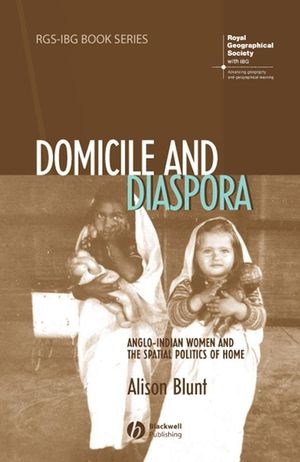‘Land of our Mothers’: Home, Identity, and Nationality for Anglo-Indians in British India, 1919–1947
History Workshop Journal
Volume 54, Issue 1
pages 49-72
DOI: 10.1093/hwj/54.1.49
Alison Blunt, Professor of Geography
Queen Mary, University of London
This paper explores the symbolic and material intersections of home, identity and nationality for Anglo-Indians (previously known as ‘Eurasians’) in the period between the Montague Chelmsford Reforms and Indian Independence. Community claims for a legitimate heritage were articulated through images of Britain as fatherland and India as motherland, and were closely tied to political attempts to gain a legitimate stake in national life. The paper examines public debates about home, identity and nationality with reference to the two main Anglo-Indian leaders of the twentieth century, Henry Gidney and Frank Anthony. While a British imperial lineage was imagined through the figure of a British forefather, political debates about home, identity and nationality largely erased the figure of an Indian maternal ancestor and instead focused on Mother India and on the domestic roles of Anglo-Indian women. The political recognition of both women and the home was an attempt not only to domesticate Anglo-Indian women, but also to domesticate a new national identity that regarded India more than Britain as home. But the home life of Anglo-Indians remained more British than Indian and political attempts to foster national loyalty to India as motherland were contested on a domestic scale. The mixed descent of Anglo-Indians was thus both manifested and erased in public debates about the future and status of the community.
…This paper is about India as ‘land of our mothers’ at a time when questions of home, identity and nationality were bound together in complex and contested ways for Anglo-Indians and other minority communities in India. Through my focus on a distinct community of mixed descent, I examine the ways in which national identity was embodied in gendered and racialized ways that reflected and reproduced a dual affiliation to both Britain and India as home. Community claims for a legitimate heritage were articulated through images of Britain as fatherland and India as motherland, and such claims were closely tied to political attempts to gain a legitimate stake in national life. For this reason, I analyse public debates about home, identity and nationality, drawing on political representations by Anglo-Indian leaders and on articles and letters published in the Anglo-Indian Review. I focus on the period from the Montague Chelmsford Report of 1919, which laid the foundations for Indianization in government employment and political representation, to independence in 1947. This also allows me to contrast the policies of the two main Anglo-Indian leaders of the twentieth century. Henry Gidney led the community from 1919 until his death in 1942, when he was succeeded by Frank Anthony, who served as president of the [All-India Anglo-Indian Association] AIAIA and as a nominated member of parliament representing community interests from 1942 until his death in 1993. Rather than render spaces of home as more symbolic than actual in forging a national identity, I argue that political attempts to foster a greater national loyalty to India as motherland rather than Britain as fatherland were contested on a domestic scale. Anglo-Indian homes continued to be imagined as more British than Indian despite political attempts by Gidney and Anthony to identify the community as a nationalist minority. Rather than explore the home merely as a feminized space, I am interested in how it also came to be shaped by a masculine imperial heritage. While a British imperial lineage was imagined through the figure of a British forefather, political debates about home, identity, and nationality largely erased the figure of an Indian maternal ancestor and instead focused on Mother India and on the present and future political roles of Anglo-Indian women within and beyond the home. While ideas of home and identity were potent sites in shaping ideas of nationality, the mixed descent of Anglo-Indians was thus both manifested and erased in public debates about the future and status of the community…
Read the entire article here.
